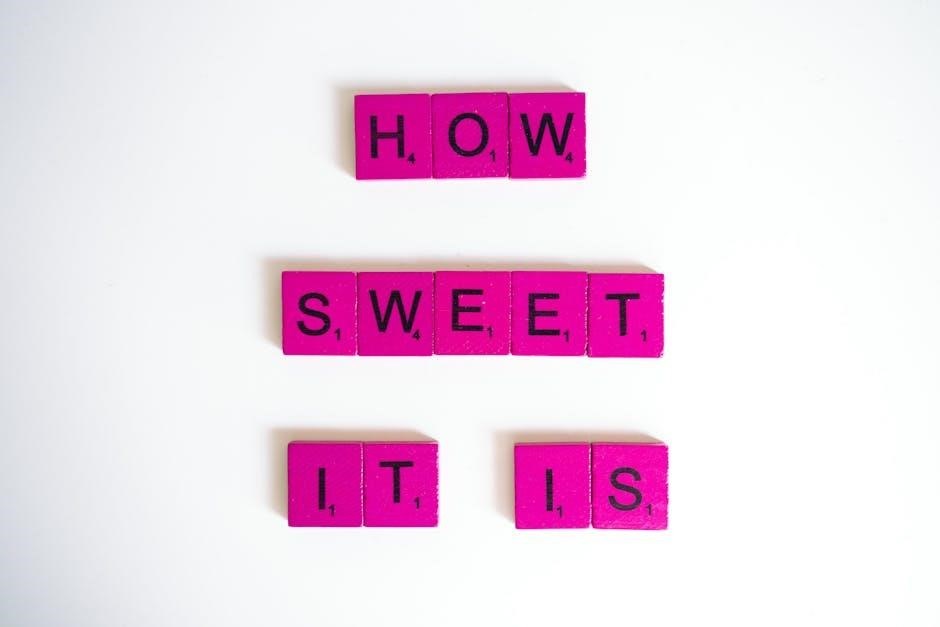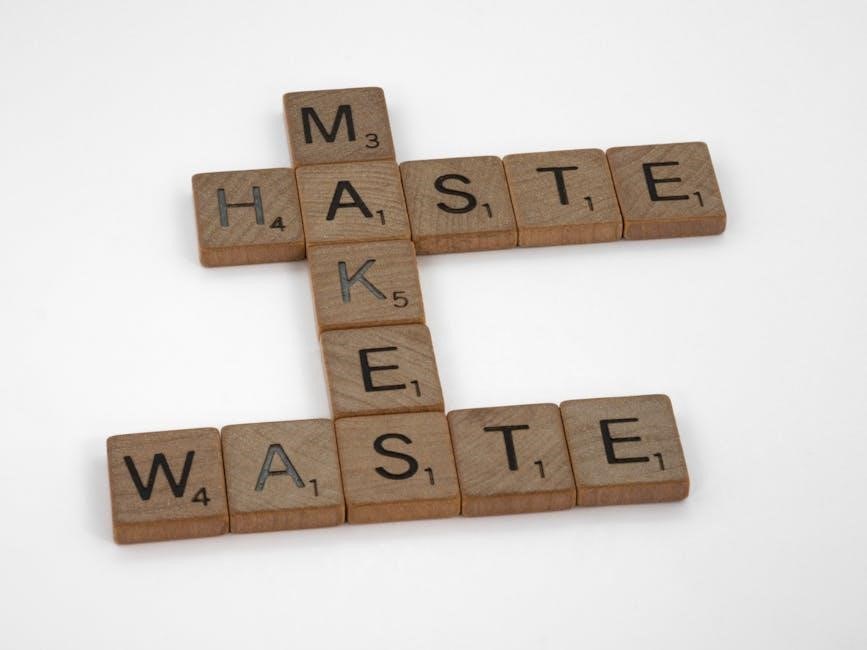Amanda Montell’s Wordslut is a bold exploration of language’s role in gender inequality, blending humor and research to reveal how language has historically marginalized women and femme-identifying individuals, while advocating for feminist reclamation and linguistic equity.
Overview of the Book and Its Author
Wordslut: A Feminist Guide to Taking Back the English Language is written by Amanda Montell, a linguist and critically acclaimed author. The book explores how language has been weaponized against women and marginalized groups, offering a fresh, humorous perspective on gendered language. Montell examines the historical and cultural roots of linguistic inequality, challenging readers to rethink their relationship with words. With sharp wit and rigorous research, she advocates for reclaiming and redefining language to promote inclusivity and equality. The book has garnered praise for its insightful and accessible approach to feminist linguistics.
The Importance of Feminist Linguistics in Modern Society
Feminist linguistics plays a vital role in challenging gendered language norms that perpetuate inequality. By examining how language shapes and reflects societal power dynamics, it empowers individuals to question and resist oppressive structures. This field advocates for inclusive communication, highlighting the need to dismantle harmful stereotypes embedded in everyday speech. Ultimately, feminist linguistics fosters a more equitable society by promoting linguistic justice and amplifying marginalized voices, ensuring that language serves as a tool for empowerment rather than exclusion.

The Power of Gendered Language
Gendered language holds immense power in shaping societal perceptions of masculinity and femininity, influencing behaviors and norms while perpetuating systemic inequalities rooted in deeply ingrained stereotypes and biases.

How Language Shapes Gender Roles and Stereotypes
Language plays a pivotal role in shaping gender roles and stereotypes, reflecting and reinforcing societal expectations of masculinity and femininity. Gendered terms often marginalize women and non-conforming individuals, perpetuating unequal power dynamics. For instance, words like “bitch” and “slut” carry gendered connotations that demean and control women’s behavior. These linguistic patterns normalize stereotypes, limiting opportunities and self-expression for marginalized groups. By examining these linguistic biases, Wordslut highlights the urgent need for reclaiming and redefining language to promote equality and challenge oppressive norms embedded in everyday speech.
The Reclamation of Gendered Terms: A Feminist Perspective
Feminist reclamation of gendered terms like “slut” and “bitch” transforms their derogatory origins into symbols of empowerment. By reclaiming these words, individuals challenge their oppressive histories, asserting agency over language. Montell argues that reclamation is not about erasing harm but repurposing terms to diminish their power to demean. This linguistic activism fosters solidarity, particularly among women and marginalized groups, while undermining stereotypes. Reclaiming language becomes a powerful tool for resistance, reshaping cultural narratives and reclaiming spaces historically dominated by patriarchal discourse.

The Historical Context of Language as a Tool of Oppression
Language has long been a tool of oppression, reflecting and reinforcing societal hierarchies. Historical examples, like the witch hunts, demonstrate how language criminalized marginalized groups, particularly women;

Language and Power Dynamics Across Centuries

Language has historically served as a tool of power, shaping societal hierarchies and reinforcing inequality. From ancient civilizations to modern times, language has been weaponized to marginalize and control, particularly women and minorities. In medieval Europe, language was used to justify witch hunts and silence women. Similarly, colonial powers imposed their languages to erase indigenous cultures. Over centuries, language has evolved as a reflection of power, often perpetuating systemic oppression and gendered norms that persist today.

From Insults to Grammar: The Evolution of Gendered Language
Gendered language has evolved from overt insults to subtle grammatical biases, reflecting broader societal attitudes toward gender. Historically, terms like “bitch” and “slut” were weaponized to demean women, while masculine terms often carried authority. Even grammar, such as the default use of “he,” has embedded gendered assumptions. Over time, language has shifted to include more inclusive forms, but remnants of these biases persist, highlighting the need for conscious linguistic reformation to challenge and change these ingrained norms.

Linguistic Justice and Marginalized Voices
Linguistic justice emphasizes the fair representation of all voices, particularly marginalized groups, in language. It addresses systemic exclusion and biases embedded in words and structures, advocating for inclusivity and equity in communication to empower those historically silenced or misrepresented.
Systemic Linguistic Injustice and Its Impact
Systemic linguistic injustice refers to the embedded biases and exclusions within language structures that perpetuate inequality. Historically, language has been used to marginalize women, racial minorities, and other oppressed groups, reinforcing power imbalances. These injustices manifest in word choices, grammatical rules, and cultural narratives, often silencing or erasing marginalized voices. The impact is profound, contributing to systemic discrimination and limiting representation. Addressing these issues is crucial for fostering inclusivity and equality in communication.
Reclaiming Language for Marginalized Groups
Reclaiming language involves transforming terms historically used to oppress into symbols of empowerment. This process allows marginalized groups to redefine narratives and challenge systemic erasure. By embracing and recontextualizing derogatory terms, individuals reclaim agency over their identities. Language reclamation fosters solidarity and visibility, contesting harmful stereotypes and promoting inclusivity. It is a powerful tool for resistance, enabling marginalized voices to reshape cultural discourse and assert their presence in spaces where they have been silenced.

The Intersection of Language and Culture
Language mirrors cultural attitudes, reflecting and shaping societal roles. Montell explores how language evolves with culture, influencing identity and power dynamics, advocating for mindful linguistic practices.
How Culture Influences Gendered Language
Culture profoundly shapes gendered language, reflecting societal norms and values. Across cultures, gendered terms vary widely, from pronouns to idioms, embedding stereotypes. Language often mirrors power dynamics, with masculine terms dominating. Montell highlights how cultural shifts influence linguistic changes, as societies evolve. For instance, gender-neutral pronouns gain acceptance as inclusivity grows. Culture’s role in shaping language underscores its adaptability and the need for mindful communication to challenge harmful norms and promote equality. Understanding this connection is vital for reclaiming language and fostering inclusivity.
The Role of Slang and Pop Culture in Shaping Feminist Language
Slang and pop culture play a pivotal role in shaping feminist language, offering creative avenues for reclamation and resistance. Terms once used to demean, like “slut” or “bitch,” are recontextualized to empower, reflecting a cultural shift toward reclaiming agency. Pop culture icons, such as Beyoncé and TV shows like Broad City, normalize gender-neutral language and challenge stereotypes. This grassroots evolution, driven by media and social movements, highlights the dynamic interplay between language, identity, and societal change, proving that words can be both weapons and tools for liberation.

The Future of Feminist Linguistics
Feminist linguistics’ future lies in education, policy reform, and grassroots movements promoting inclusive language. Advocacy for gender-neutral terminology and linguistic equity will drive meaningful societal transformation, fostering equality.
Education and Awareness in Promoting Linguistic Equality
Educational programs and public awareness campaigns are crucial in fostering linguistic equality. By integrating feminist linguistics into school curricula, future generations can grow up with a nuanced understanding of language’s impact on gender roles and stereotypes. Workshops, literature, and media can amplify marginalized voices, encouraging individuals to question and challenge harmful linguistic norms. This collective effort can lead to a more inclusive and equitable use of language across society.
Policies and Practices for a More Inclusive Language
Implementing inclusive language policies is essential for creating equitable communication environments. Governments, institutions, and organizations should adopt guidelines that promote gender-neutral terminology and reject harmful stereotypes. Practices such as using non-binary pronouns, avoiding gendered insults, and encouraging diverse representation in media can foster linguistic inclusivity. These efforts, supported by education and awareness, can help dismantle systemic biases and create a language landscape that values and respects all identities equally.
Wordslut empowers readers to reclaim and reshape language, challenging harmful norms and fostering inclusivity. By collectively transforming how we speak, we can create a more equitable linguistic future.
Final Thoughts on the Importance of Feminist Linguistics
Feminist linguistics is not just an academic exercise but a vital tool for challenging systemic inequality. Language shapes how we perceive gender roles and power dynamics, often reinforcing harmful stereotypes. By examining and reclaiming language, we can dismantle these biases and create a more inclusive world. Montell’s work reminds us that language is not neutral—it has historically excluded women and marginalized groups. Reclaiming and redefining words empowers individuals to challenge these norms and advocate for a more equitable society. Awareness and action are crucial in this ongoing linguistic revolution.
A Call to Action for Language Reclamation
Montell urges readers to actively engage in language reclamation by challenging harmful linguistic norms. This involves questioning gendered terms, embracing inclusive language, and celebrating diverse voices. By doing so, individuals can contribute to a cultural shift that values equity and representation. Education and awareness are key—sharing knowledge about the impact of language can inspire collective action. Ultimately, reclamation is not just about words; it’s about reclaiming power and fostering a more just society where language reflects and respects all people.
